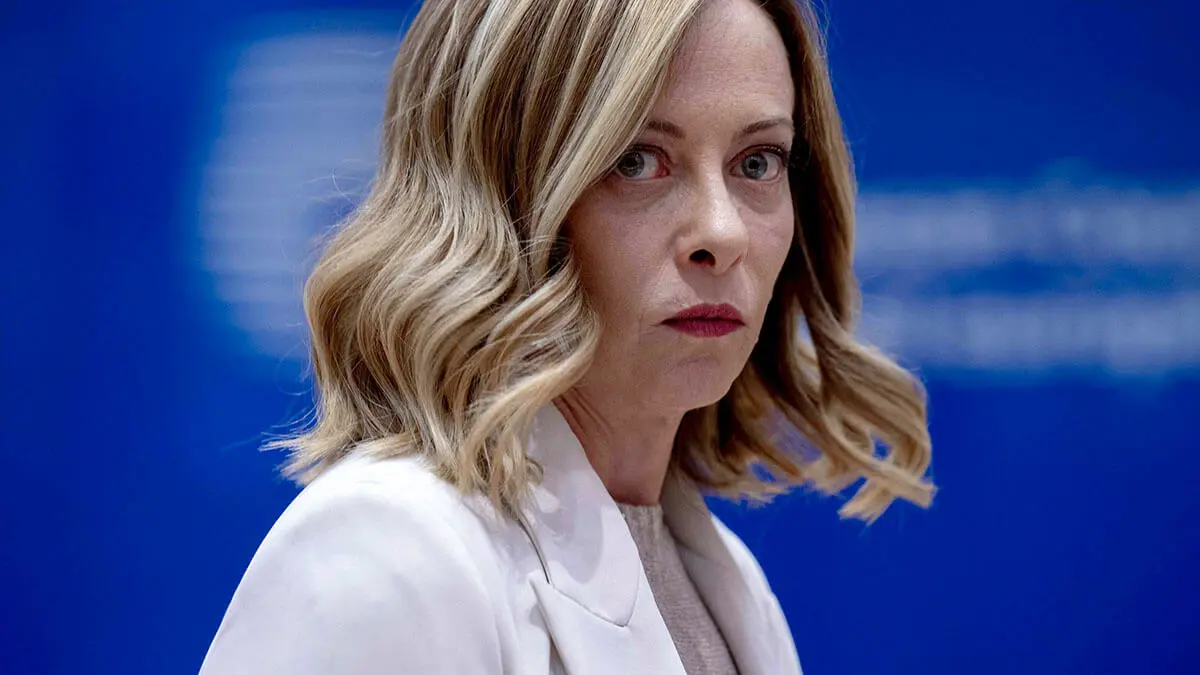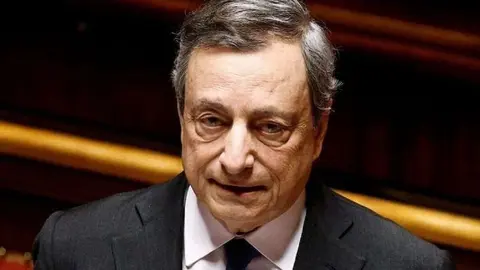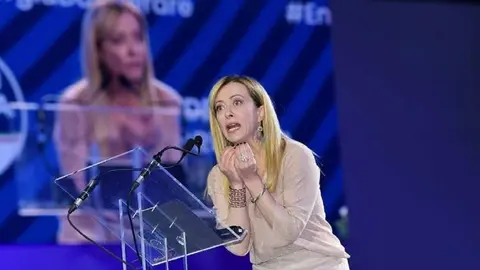Prime Minister Meloni begins (by force) to understand the inner workings of the EU

This was the first opportunity for the Roman Meloni, president of the transalpine Council of Ministers since 22 October 2022, to face negotiations with the main European leaders. And it can be said that, at least so far, the still young Roman politician has shown an extraordinary level of "bisoñezez": so many years in the ranks of "euroscepticism" have left her out of the EU power game, and, when she has started to negotiate, she has learned how much weight she carries in the European institutions. Judging by her reaction, far less than she thought she would. In reality, her behaviour, marked by an evident snub, is pure "posturing", as she has two people in her executive, Deputy Prime Minister Tajani and Minister Fitto, who know perfectly well how these negotiations work, and so she has not wanted to see what her closest collaborators have been letting her know in the weeks leading up to the European summit.
The first time she felt snubbed by European leaders was a fortnight ago, when there was a "meeting of six" between representatives of the European families: two for the Conservatives, two for the Socialists, and two for the Liberals. The German chancellor, the French head of state, the Spanish head of government, and even the former Dutch prime minister (Mark Rutte, one of the two liberal leaders along with Macron) took part, but Meloni was not allowed to attend this first meeting. The reason? Very clear: the pact between conservatives (we are talking about the European People's Party), socialists and liberals will produce the majority that will govern the European Union for a five-year period (2024-29). And Meloni, who is not in any of the three, but in the Eurosceptic Reformists and Conservatives, was excluded. A meeting where it was agreed that Von der Leyen would repeat as President of the Commission, that Portugal's Costa would be the new President of the European Council and that Estonia's Kallas would be the new head of EU diplomacy.
When she was not included in this pact, Meloni left the European summit with the greatest possible anger, despite the fact that the agreement was not definitive. And she reported on this in Parliament, first in the lower house and then in the upper house, claiming that European leaders "were against Italy". This is simply untenable, because the European Union cannot leave the eurozone's third largest economy marginalised from decision-making, and even less so a country that holds the status of "founding country". Neither Tajani nor Salvini were going to reply, because both are part of the coalition, and neither could Ely Schlein, who, although an MEP from 2014 to 2019, does not know what it is like to negotiate European seats.
So the answer had to be given, paradoxically, by Matteo Renzi, who was beaten at the polls, and he did so in the Senate, where he sits. Renzi, who had been a candidate for these European elections with the coalition "with Emma Bonino for the United States of Europe" (basically, the sum of Italia Viva and Piu Europa), did not win a single seat in the 9 June elections: with a "sbarramento" of 4%, the 3.8% of support he obtained at the polls did not entitle him to a single MEP. But that does not mean that Renzi does not know perfectly well how EU negotiations work: he himself had to negotiate on behalf of his country the distribution of seats that took place in July-August 2014, as he had been the "premier" since February of that year. In addition, in the 2019 negotiations, he also had a certain capacity to intervene: he was also in the coalition government when it was decided that the also former Prime Minister Paolo Gentiloni would take on the post of Commissioner for Economic Affairs.
In a very forceful intervention, not lacking in fine irony, Renzi accused Meloni of "lacking intellectual honesty", an elegant way of telling him that he was being untruthful in recounting what had happened at the European summit. And he told Meloni, with facts in hand, that it was by no means true that European leaders were against Italy, because they had not been against Italy on any occasion in the last few rounds of seat allocations: in 2011, they were given the presidency of the European Central Bank (ECB) in the person of Mario Draghi; in 2014, EU diplomacy, which went to the former foreign minister of the Renzi government (Federica Mogherini); and in 2017, they had been granted the presidency of the European Parliament, which went to Antonio Tajani; and in 2019 they had been given both a new presidency of the European Parliament (in the person of the socialist Davide Sassoli, who died in December 2021) and the aforementioned commissioner for Economic Affairs (in charge of the aforementioned Gentiloni). And all of this while governing the centre-right, the centre-left or the populist Five Star coalition with the Democratic Party (PD). So, in Renzi's words, why would Italy not be taken into account in these new negotiations, given what has happened in the recent past?
Meloni has failed to see that there are three fundamental elements that determine who gets EU leadership positions: firstly, the size of the economy; secondly, the state of that same economy; and finally, membership of a particular European family. And of these three elements, Meloni fulfilled only the first (only Germany and France have a higher Gross Domestic Product). In the case of the second, Meloni appeared at the summit not only with the traditional debt default (what is the Roman leader complaining about when her country's debt stands at 137% of GDP while the Stability and Growth Pact sets a maximum of 60%?), but also with the recent opening of a file for deficit infringement: she should have closed the 2023 accounts with a deficit of 3%, but she has taken it to no less than 7.4%. Overlooking, moreover, that Macron's France has also been reprimanded (in its case the deficit was 5.4%) and that Spain was also about to receive the same opening of proceedings, but the 3.6% that its public accounts have presented indicate that its dynamic is approaching the required 3%, which is why the government headed by Pedro Sánchez was not finally reprimanded.
And there was still the most relevant aspect: Meloni obtained 29% of the votes in the European elections, but his MEPs have only served to swell the ranks of Euroscepticism, with less weight than ever after the United Kingdom's departure from the Union (Withdrawal Agreement of December 2020). If David Cameron, in 2014, refused to allow Jean-Claude Juncker to be the President of the Commission, with the UK then representing the second largest European economy after Germany, and his refusal was completely ignored, why should Meloni be given more consideration now?
Negotiations on the distribution of leadership positions have not yet been finalised. The European Council has agreed that Von der Leyen will repeat in the Commission, Costa will be the new Council President and Kallas will head EU diplomacy. But the key vote will take place on 18 July, when it will be seen whether Von der Leyen achieves the necessary majority. Given that the vote is secret and that there is no shortage of "snipers" (MPs who vote against their leader's orders), Von der Leyen knows that she has to run with a larger majority. There are two possibilities: either accept the vote of the Greens (who have already offered it), or bring in Meloni and his 70+ Eurosceptic votes from the reformists and conservatives.
The "Greens" are not very reliable, as they have too much of a tendency to break vote discipline: the only advantage is that they are highly regarded by the socialists. Meanwhile, reformists and conservatives are a much safer vote, but would shift the parliamentary majority to the right. In the event that conservatives, socialists and liberals were to opt for Meloni and his party, then it would be time to negotiate with "breadth of vision": a top-level vice-presidency with one of the most prominent commissioners (in principle, Competition or Energy, as Economic Affairs should rotate to others). And with a clear candidate: the Pugliese Fitto, who has already been an MEP and who in the current Executive manages the 209 billion "Recovery Fund" earmarked for his country in July 2020.
Meloni must not forget something fundamental: not only does having a large "maggioranza" to govern automatically translate into a great deal of power in EU institutions, but a fundamental part of this "maggioranza" is led by one of the politicians most detested by European leaders (Matteo Salvini, deputy prime minister, head of infrastructure and leader of the League). And the fact is that Meloni has a "sin of origin": Italy was the only country, of the 27 that currently make up the EU, that refused to ratify the "European Stability Mechanism" or ESM, a key instrument in the Banking and Monetary Union that, as fate would have it, was put into operation by the Italian Mario Draghi when he presided over the European Central Bank (ECB). And these slips have a cost, which now comes in the form of temporary marginalisation.
The reality is that the 'Eurosceptic' Meloni was 'expected' by a number of European leaders; and that the European Union is reformed from within, not by criticism from outside, which is what Roman politics has been doing for years. So it would be better for him to listen more to Tajani and Fitto and use less populist demagogy, something that is less and less popular among increasingly jaded transalpine voters.
Pablo Martín de Santa Olalla Saludes is a lecturer in the Faculty of Communication and Humanities at the Camilo José Cela University (UCJC) and author of the book "Italia, 2018-2023. De la esperanza a la desafección" (Liber Factory, 2023).



